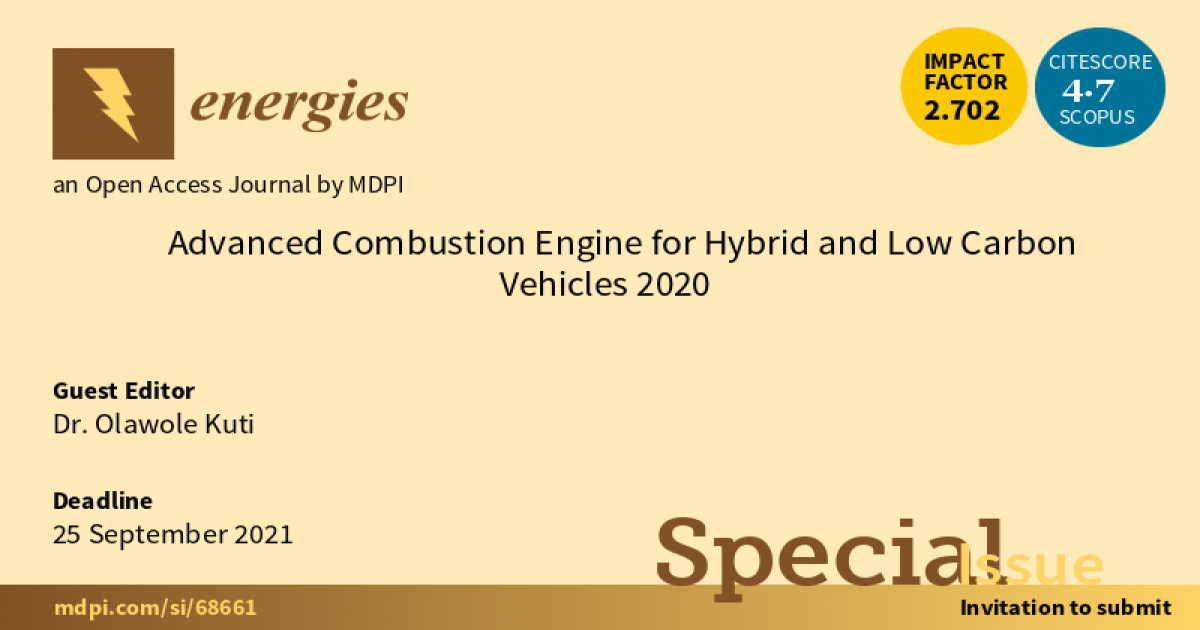- 3.2Impact Factor
- 7.3CiteScore
- 17 daysTime to First Decision
Advanced Combustion Engine for Hybrid and Low Carbon Vehicles 2020
This special issue belongs to the section “E: Electric Vehicles“.
Special Issue Information
Dear Colleagues,
In achieving a zero or low carbon environment, stringent emission legislations are being proposed by several developed countries and those of emerging market and this could lead to future ban on vehicles operating solely on internal combustion engines (ICE) promoting electric vehicles. In meeting up with the power requirements in heavy duty vehicles like the one used for freight operations, there will still be prospects for ICE engines and this could be combined with electric drives making it hybrid. Low carbon fuel such as biofuel from various feedstocks such as agricultural residues, municipal wastes and used cooking oil is expected to play vital role in emission reductions in ICE. These feedstocks have high prospects for producing biofuel sustainably without competing with food production.
The purpose of this special issue is to address the advances related to combustion engines that could be used for hybrid vehicles i.e. with battery or fuel cell. Furthermore, this special issue will address the performance of combustion engines running on low carbon fuel.
We invite original manuscripts presenting recent advances in this area with special reference to the following topics:
- Optimization of hybrid vehicle systems running on biofuel;
- Characterization of biofuel for advanced combustion engine;
- Thermal and electrical management of battery for hybrid vehicles;
- Biofuels for advanced combustion engines;
- System modelling and validation;
- Fuel cell system design and testing;
- Real world testing for hybrid and low carbon fuel vehicles;
- Plug-in-Hybrids;
- Hydrogen and Fuel Cells.
Dr. Olawole Kuti
Guest Editor
Dr. Olawole Kuti
Guest Editor
Manuscript Submission Information
Manuscripts should be submitted online at www.mdpi.com by registering and logging in to this website. Once you are registered, click here to go to the submission form. Manuscripts can be submitted until the deadline. All submissions that pass pre-check are peer-reviewed. Accepted papers will be published continuously in the journal (as soon as accepted) and will be listed together on the special issue website. Research articles, review articles as well as short communications are invited. For planned papers, a title and short abstract (about 250 words) can be sent to the Editorial Office for assessment.
Submitted manuscripts should not have been published previously, nor be under consideration for publication elsewhere (except conference proceedings papers). All manuscripts are thoroughly refereed through a single-blind peer-review process. A guide for authors and other relevant information for submission of manuscripts is available on the Instructions for Authors page. Energies is an international peer-reviewed open access semimonthly journal published by MDPI.
Please visit the Instructions for Authors page before submitting a manuscript. The Article Processing Charge (APC) for publication in this open access journal is 2600 CHF (Swiss Francs). Submitted papers should be well formatted and use good English. Authors may use MDPI's English editing service prior to publication or during author revisions.
Keywords
- hybrid vehicles
- low carbon fuels
- internal combustion engines
- battery and fuel cell

Benefits of Publishing in a Special Issue
- Ease of navigation: Grouping papers by topic helps scholars navigate broad scope journals more efficiently.
- Greater discoverability: Special Issues support the reach and impact of scientific research. Articles in Special Issues are more discoverable and cited more frequently.
- Expansion of research network: Special Issues facilitate connections among authors, fostering scientific collaborations.
- External promotion: Articles in Special Issues are often promoted through the journal's social media, increasing their visibility.
- e-Book format: Special Issues with more than 10 articles can be published as dedicated e-books, ensuring wide and rapid dissemination.

